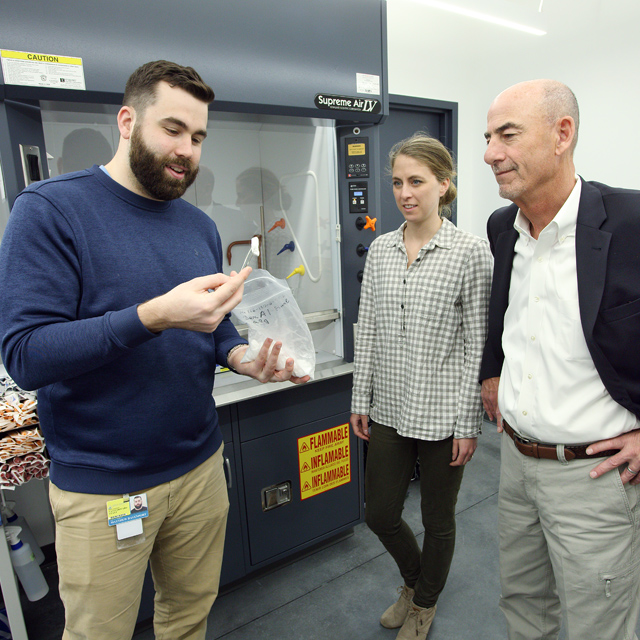The BioTechnical Institute of Maryland Inc. (BTI) provides tuitionfree training to high school graduates in Baltimore City. Johns Hopkins is one of the 25 organizations that offer hands-on experience for their interns so they can go on to pursue careers in on-demand biotech jobs.
David Maestas, a Johns Hopkins University biomedical engineering Ph.D. student, has trained five BTI students in his lab, where he studies regenerative medicine.
He says mentoring interns through the BTI program allows him to give back to the community while getting extra help in his lab. “I came across BTI from an internet search. In the beginning, I thought that I was going to start from ground zero with training them, but I quickly realized these people are well-trained before they get here,” says Maestas.
That’s because they go through a nineweek program that combines classroom instruction and hands-on training in laboratory basics, such as how to grow and harvest cells, the basics of molecular biology, clean room gowning and properly disposing of biohazardous waste.
Margaret “Sue” Penno, of the Johns Hopkins Genetic Resources biorepository and All Children’s Hospital biorepository, founded BTI 20 years ago. Kathleen Weiss, executive director of BTI, says the institute has lifted economic and social barriers to meaningful careers for hundreds of Baltimore area residents. “We have people who come to us at a level of skills that needs upgrading and we are here to do that,” she says. “You learn best when you do and when you perform. You put on the goggles and lab coat. You are a professional.”
Students complete the program with a paid internship of up to 400 hours, which serves as a capstone, and Maestas says he is ready to take on more interns. “I can only spend so much time myself at the lab bench, organizing, labeling and running things on machines,” says Maestas. “Having the interns hereto help has been a huge boost for our research.”
Weiss says the hope is that the internships lead to permanent employment. To date, about 375 program graduates have filled lab technician jobs at scores of universities, hospitals and life science companies. Johns Hopkins alone employs 25 percent of program alumni. Weiss recalls one of her students who came to BTI homeless and living in emergency housing. After graduating from BTI, she accepted a lab position at an emerging local biotechnology company, all the while pursuing her bachelor’s degree and then a master’s degree. She is now working at a senior level for an international life sciences firm, has become a homeowner and is contemplating a Ph.D.
Maestas wants his Johns Hopkins colleagues to know that hiring a BTI intern is a win-win opportunity. “The interns are sincere, enthusiastic and dedicated to learning new things,” he says. “It provides experience and mentoring for people in the local community who you can trust with your experiments. What’s better than that?”

